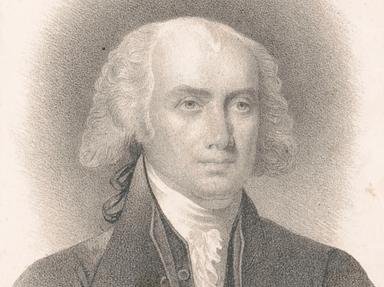Quiz Answer Key and Fun Facts
1. Known as the "Father of the Constitution," how many biological children did Madison actually have?
2. One of America's first professional politicians, Madison never held a job that was out of the public eye before his retirement from the presidency. He did, however, consider a career in the private sector. What was it?
3. Madison lost only one election in his entire political career.
4. As Jefferson's secretary of state, Madison whole-heartedly supported the president's Embargo Act of 1807. What was the goal of the embargo?
5. What was unique about Madison's vice-presidents?
6. How many times did Madison serve as a member of the Virginia House of Delegates?
7. The War of 1812, or the Anglo-American War, was the most significant event during Madison's tenure as U.S. president. When he asked Congress for a declaration of war with England, Madison gave a host of reasons why war was necessary. Which of the following was NOT a declared reason for war?
8. After the British burned much of Washington, D.C., President Madison moved Congress to Philadelphia to carry on the business of government.
9. After leaving the public eye in 1817, Madison stayed active in the local political scene. Much of his time was spent fighting the extension of slavery. What organization did Madison help organize that was devoted to the ending slavery in America?
10. When Madison died on June 28, 1836, who delivered his eulogy?
Source: Author
trammgr
This quiz was reviewed by FunTrivia editor
DakotaNorth before going online.
Any errors found in FunTrivia content are routinely corrected through our feedback system.
